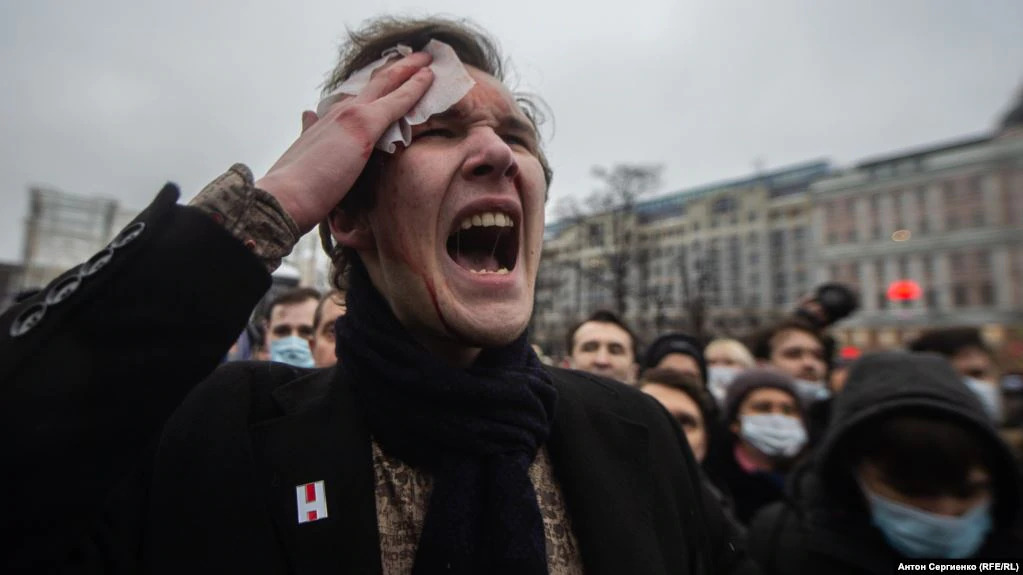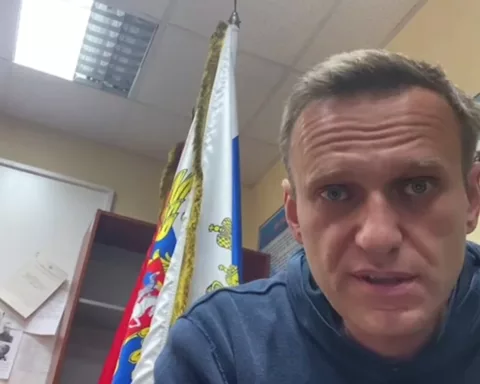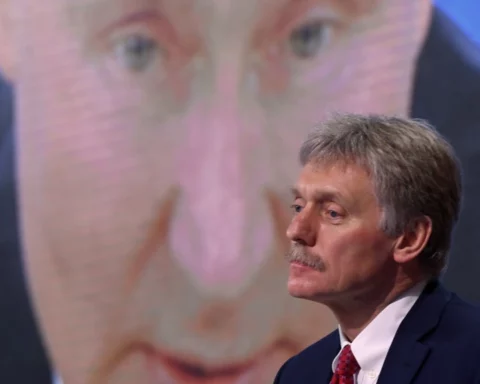“Putin’s a thief!”
The last time Russia saw a day of rallies with such geographic scope was in March 2017, after Navalny released a video alleging corruption by then-Prime Minister Dmitry Medvedev. This time, an immediate catalyst appeared to be a video report targeting the wealth of President Vladimir Putin himself.
The nationwide demonstrations were initiated by the Kremlin’s most vocal critic, who languishes in jail, and staged under the slogan “Free Navalny!” But analysts say that the “Palace for Putin” investigation has combined with anger over Navalny’s jailing in a way that may reorient the political balance in Russia going forward.
“There are two different motives for the protesters, but they are converging,” political analyst Abbas Gallyamov told RFE/RL. “Navalny is becoming synonymous with the fight against corruption.”
Navalny returned to Russia on January 17 after five months in Germany recovering from the effects of a nerve-agent poisoning he blames on Putin, apparently banking on enough popular support to help him escape a long prison sentence threatened by the authorities – and mount a robust challenge to Putin’s power.
The following day, he was jailed for a month pending a court hearing on parole violation charges that could land him behind bars for 3 1/2 years. Before he was led away, he called on Russians to hit the streets in a huge show of solidarity.
In the video report released the next day – which has now been seen more than 70 million times on YouTube — he told his viewers that Putin and his associates “will keep stealing more and more until they bankrupt the whole country.”
Revealing what the investigative report says is a $1.36 billion palace on the Black Sea that ultimately belongs to Putin, Navalny said: “Russia sells huge amounts of oil, gas, metals, fertilizer, and timber — but people’s incomes keep falling and falling, because Putin has his palace.”
Russians responded in droves on January 23, protesting in at least 60 cities and braving winter temperatures that plunged as low as minus 52 degrees Celsius in Yakutsk, Siberia. Many held placards and signs citing the “Palace For Putin” investigation and denouncing official corruption.
Police reacted with force, wading into peaceful protests, wielding batons and shields to disperse crowds, and filling riot vans with activists — including Navalny’s wife, Yulia Navalnaya, who had returned with him to Moscow from Germany. By late evening in Moscow, more than 3,400 people had been detained across the country, according to the OVD-Info protest monitor group.
Russian state TV largely ignored the protests, but pro-government online streams baselessly accused Navalny of brainwashing Russia’s youth into dissent, a line often advanced by the authorities in attempts to discredit the opposition movement.
“It’s not their own kids that they’re bringing out,” a guest on an online chat show run by the state-owned RT channel said about Navalny and his allies. “Navalny’s kids aren’t even in Russia!”
But evidence of mass teenage participation appeared slim. In Moscow, an estimated 40,000 people came to a protest in central Pushkin Square, with few minors visible in the crowd. A 14-year-old boy who told a reporter he had come “to have a look” was later roughly detained by police amid cries of, “He’s just a child!”
Navalny’s call for a protest in the midst of winter and the COVID-19 pandemic was seen as a gamble and a test of his ability to mount significant support for a new push against Putin, who has been in power for two decades and last year, in a referendum lambasted by critics, secured the right to run for reelection in 2024 and again in 2030.
It was not immediately clear whether the sizable, widespread protests would result in Navalny avoiding a lengthy prison sentence. In 2013, large rallies in his support outside the Kremlin and other Moscow landmarks were credited with getting his five-year prison sentence suspended.
“If protests on January 23 don’t bring about an immediate result — the release of Aleksei Navalny — then such events will happen again and again,” Navalny aide Leonid Volkov told Current Time, the Russian-language network run by RFE/RL in cooperation with VOA.
The future of Russia’s embattled opposition movement also remains uncertain, but the size of the protests — even in the face of a concerted weeklong crackdown aimed at thwarting them — suggests that a substantial number of Russians may be determined to keep up the pressure.
Tatyana Stanovaya, a political analyst, said that the Russian authorities “made two critical mistakes — Navalny’s poisoning and his arrest,” suggesting that instead of sidelining him, the Kremlin has only strengthened his base.
“The results of many, many years of painstaking work by the Kremlin to push the real opposition” to the political margins “were ceremoniously buried today in a single day,” Stanovaya wrote on Telegram.
The harsh police response and high number of arrests also point to what could be a bitter and protracted standoff if the rallies persist in the weeks ahead, especially with potentially pivotal parliamentary elections due to be held in September.
In the meantime, Putin’s popularity has slipped amid the pandemic and anger over what many view as inadequate state support during Russia’s attendant economic crisis. The president has spent much of the time in recent months at his residence outside Moscow, making few public appearances.
Neither has he commented publicly on Navalny’s report about the Black Sea palace, which his spokesman quickly dismissed as “lies.”
“Navalny has taken over the initiative,” analyst Gallyamov said. “Now the state is defending itself.”








